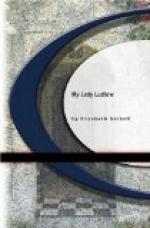“‘My Aunt Babette is out of coffee.’
“‘I am sure I do not know,’ said Pierre.
“’Yes, she is. I heard her say so. Tell her that a friend of mine has just opened a shop in the Rue Saint Antoine, and that if she will join me there in an hour, I will supply her with a good stock of coffee, just to give my friend encouragement. His name is Antoine Meyer, Number One hundred and Fifty at the sign of the Cap of Liberty.’
“’I could go with you now. I can carry a few pounds of coffee better than my mother,’ said Pierre, all in good faith. He told me he should never forget the look on his cousin’s face, as he turned round, and bade him begone, and give his mother the message without another word. It had evidently sent him home promptly to obey his cousins command. Morin’s message perplexed Madame Babette.
“‘How could he know I was out of coffee?’ said she. ’I am; but I only used the last up this morning. How could Victor know about it?’
“‘I am sure I can’t tell,’ said Pierre, who by this time had recovered his usual self-possession. ’All I know is, that monsieur is in a pretty temper, and that if you are not sharp to your time at this Antoine Meyer’s you are likely to come in for some of his black looks.’
“’Well, it is very kind of him to offer to give me some coffee, to be sure! But how could he know I was out?’
“Pierre hurried his mother off impatiently, for he was certain that the offer of the coffee was only a blind to some hidden purpose on his cousin’s part; and he made no doubt that when his mother had been informed of what his cousin’s real intention was, he, Pierre, could extract it from her by coaxing or bullying. But he was mistaken. Madame Babette returned home, grave, depressed, silent, and loaded with the best coffee. Some time afterwards he learnt why his cousin had sought for this interview. It was to extract from her, by promises and threats, the real name of Mam’selle Cannes, which would give him a clue to the true appellation of The Faithful Cousin. He concealed the second purpose from his aunt, who had been quite unaware of his jealousy of the Norman farmer, or of his identification of him with any relation of Virginie’s. But Madame Babette instinctively shrank from giving him any information: she must have felt that, in the lowering mood in which she found him, his desire for greater knowledge of Virginie’s antecedents boded her no good. And yet he made his aunt his confidante—told her what she had only suspected before—that he was deeply enamoured of Mam’selle Cannes, and would gladly marry her. He spoke to Madame Babette of his father’s hoarded riches; and of the share which he, as partner, had in them at the present time; and of the prospect of the succession to the whole, which he had, as only child. He told his aunt of the provision for her (Madame Babette’s) life, which he would make on the day when he married




